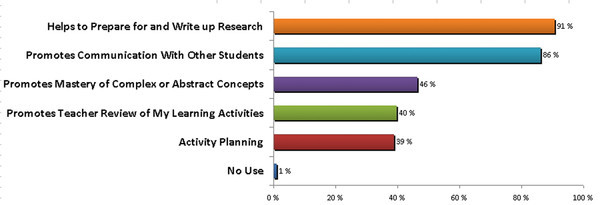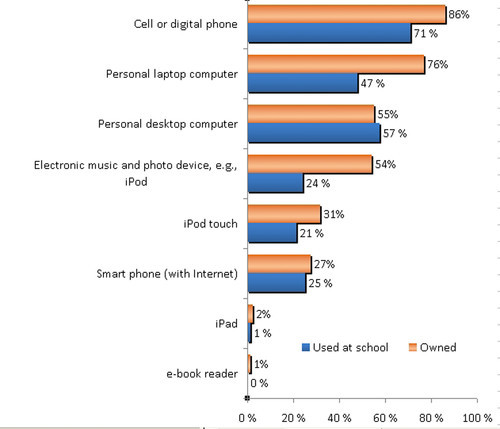A Portrait of the Technological Skills and Habits of Today’s College Students
Educational applications of information and communication technology (ICT) are growing in popularity in college pedagogy, but while in the U.S. and in other major industrialized countries, large surveys are conducted to obtain a technological portrait of students, we know almost nothing of the students in our college network. To remedy this situation, an extensive survey was conducted in April 2011 by researchers at the Université de Montréal and the HEC to study the habits and technological skills of college students.
This survey was conducted on the Internet with 30,724 students from some 77 institutions of the college system in Quebec, about 17% of the total student population attending D.E.C. programs in the regular education sector.
First, from the student perspective, it is clear that ICTs facilitate learning by improving the student experience, by facilitating research and through positive effects on relationships with other students.

Perceptions of IT Usage.
Students enjoy learning by doing Web searches, but also by using ICT in independent learning tasks. They see ICTs as useful in their academic lives and say that their use has important repercussions for the labor market. These perceptions indicate that certain uses of ICT are motivating for students, and teachers should be encouraged to use them.
Students generally consider that most of their teachers make effective use of ICT, and that as students, they are well prepared in their use, even if student courses on technology are offered infrequently.
College students are well equipped in terms of technology (86% own a cell phone, 76% a laptop), but many students do not bring their laptops to school. This elevated rate of penetration for mobile equipment allows us to imagine different scenarios for easy classroom access to ICT. However, this also engenders pedagogical challenges, 74% of students admitting to having texted during their courses and half (47%) admitting to sending messages on Facebook. Updating methodology using mobile devices to improve access to ICT in the classroom, however, requires an institutional reflection on the conditions for channeling the use of such equipment for learning and the associated costs (wi-fi, electricity, etc.).

Equipment Owned by Students and Used at School.
Overall, student use of ICT focuses on a few well-known tools: the office suite (word processor, presentation software, spreadsheet), Internet search and navigation, social networking (Facebook), and electronic communication. These are also the uses for which students feel the most competent. While almost all students are regular users of Facebook, most of them do not know and do not use other social media such as blogs, wikis, social bookmarking, etc. Numerous tools that have an important educational potential (such as software for creating concept maps or electronic portfolios) remain unknown to students, probably because they are also unknown to many teachers. Training aimed at students and teachers could probably optimize the potential of ICT.
For college students, social networking is Facebook. They are heavy users and use it not only in their social lives, but also in their academic lives with their peers. They take particular interest in activities and discussions related to their school life, but seem to prefer that the space remains a student space. In many cases, Facebook groups are created for a course, but the teacher will not be invited. This raises some questions.
Students are moving away from print to online resources (Google and Wikipedia) for information research. They rate themselves competent in almost all aspects of information technology. The courses offered to students in information technology mastery could build on their preferences for electronic media, and focus on the indexes, databases and resources available in this way (Google Scholar, library catalogs, ERIC, library connected, PubMed, etc.).
Students frequently use electronic communication, especially institutional messaging in their interactions with their teachers, but they also meet them face-to-face regularly. If Facebook is the preferred vehicle to communicate with their peers, internal messaging is the institutional vehicle for communication with teachers. The use of this medium for communication between students and teachers should be encouraged.
Note: The report summary is available in French at the following address: http://www.sondagetic.org/cegeps/RapportSyntheseFinal.pdf.
Each college-level institution which generated over 100 valid responses to the questionnaire will also receive an individual report.
What do you think of these results? Do they surprise or motivate you? Do they match your impressions of college students? Do students seem ready to increase their use of ICT for academic purposes? Share you reactions and comments.

